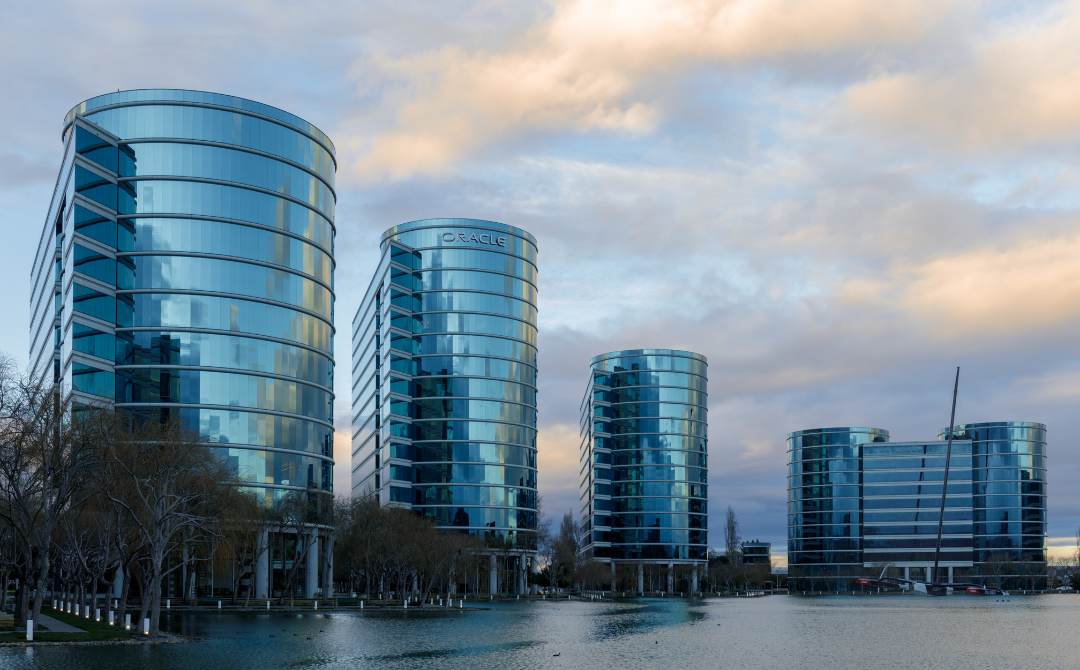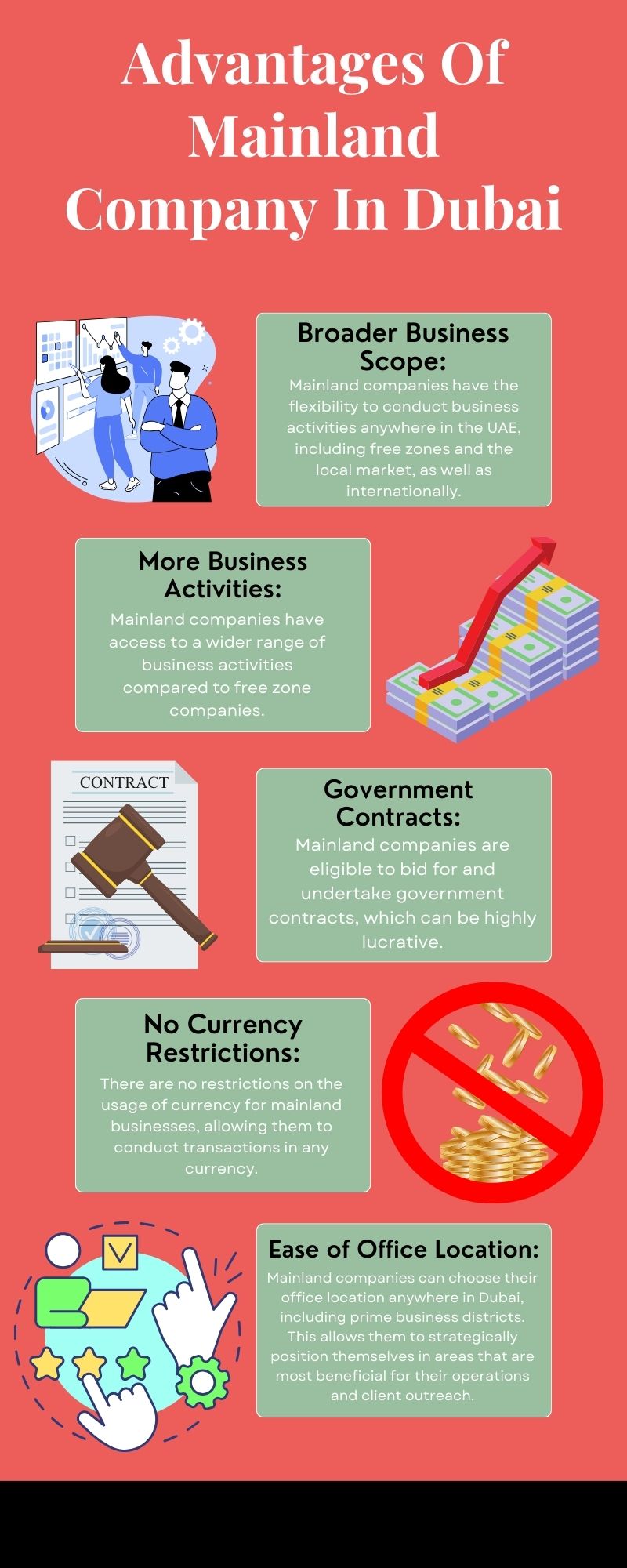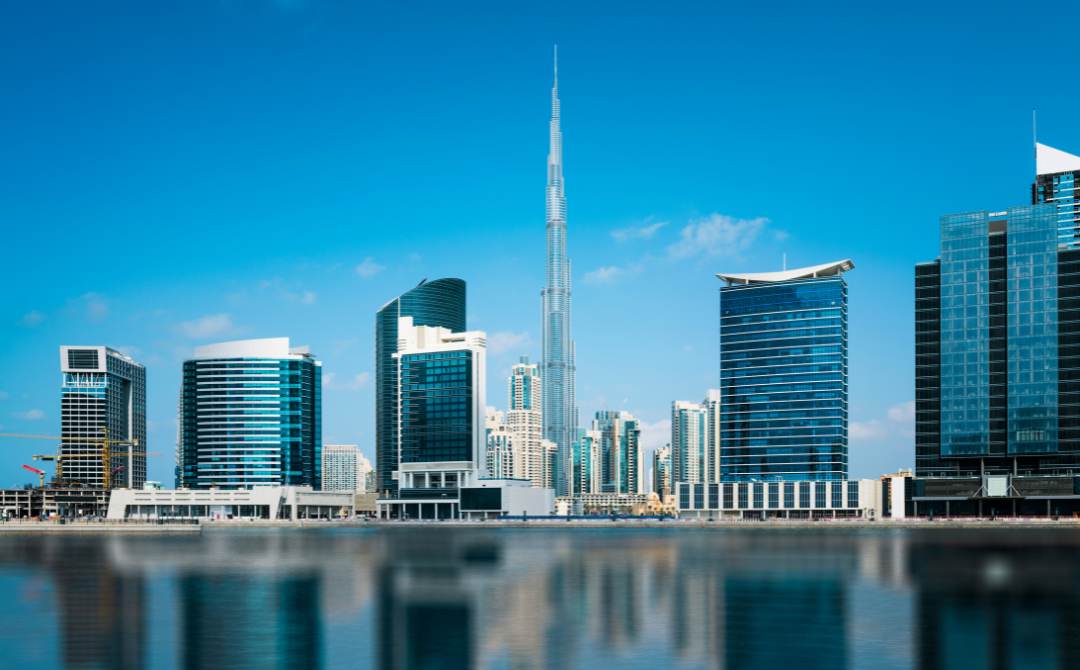Should You Start Your Company In Dubai Mainland Or Free Zone?
Are you considering starting your company in Dubai but unsure whether to choose the Mainland or a Free Zone? It’s a common problem that many entrepreneurs face. The choice between the two depends on various factors such as ownership regulations, licensing requirements, and business setup costs.
This article is here to help you guide through this decision-making process. By the end of this read, you’ll have a clearer understanding of which option aligns best with your business goals and aspirations.
So, let’s get started.
Mainland Vs. Free Zone Companies In Dubai
When setting up a business in Dubai, you have the option to choose between a mainland company and a free zone company. Each has its own set of benefits and restrictions, depending on your business needs.
Let’s discusss them in detail.
Mainland Companies:
Mainland companies are registered with the Department of Economic Development (DED) and can conduct business anywhere in the UAE and outside the country.

Some of the charactristics of mainland companies in Dubai are:
- They require a local sponsor or a UAE national partner for certain business activities, who traditionally held 51% ownership. However, recent changes now allow 100% foreign ownership for selective business activities.
- There are no restrictions on the number of visas that can be issued, and the number is usually based on the size of the office space.
- Mainland companies must have a physical office space with a minimum requirement of 200 square feet.
- All mainland companies are required to prepare a financial audit at the end of each fiscal year.
Free Zone Companies:
Free zones are specific areas within the UAE that have their own set of rules and regulations and are managed by a Free Zone Authority (FZA).
Companies registered and working in these areas can enjoy a range of benefits including:
- Free zone companies can enjoy benefits such as 100% foreign ownership, 100% repatriation of capital and profits, and exemption from import and export duties.
- They are restricted to conducting business only within the free zone or outside the UAE unless they partner with a local distributor for trading on the mainland.
- Free zone companies are generally allowed between 1 to 6 visas, depending on the regulations of the specific free zone and the size of the office space.
- The requirement for a physical office varies; many free zones allow companies to have virtual offices, and not all free zones require companies to process yearly financial audits.
So these are the major differences between Free Zone and Mainland companies in Dubai. Now let’s discuss the actuall advantages and disadvantages of both companies in terms of business and flexibility.
Advantages Of Mainland Company In Dubai:

- Broader Business Scope: Mainland companies have the flexibility to conduct business activities anywhere in the UAE, including free zones and the local market, as well as internationally. This allows them to reach a wider audience and engage in a broader range of business activities without geographical restrictions.
- More Business Activities: Mainland companies have access to a wider range of business activities compared to free zone companies. They can engage in various sectors such as trading, manufacturing, and services, providing them with more opportunities for diversification and growth.
- Government Contracts: Mainland companies are eligible to bid for and undertake government contracts, which can be highly lucrative. This is a significant advantage for businesses looking to engage in public sector projects.
- No Currency Restrictions: There are no restrictions on the usage of currency for mainland businesses, allowing them to conduct transactions in any currency. This provides greater flexibility in financial operations and reduces exchange rate risks.
- Ease of Office Location: Mainland companies can choose their office location anywhere in Dubai, including prime business districts. This allows them to strategically position themselves in areas that are most beneficial for their operations and client outreach.
Also Read: Offshore Company Setup In Dubai: 2024 Guide
Disadvantages Of Mainland Company In Dubai:

- Local Sponsor Requirement: Traditionally, mainland companies required a local UAE national as a sponsor, who would hold a majority stake (51%) in the company. However, this requirement has been relaxed for certain business activities, allowing for 100% foreign ownership in some cases.
- Mandatory Physical Office: Mainland companies are required to have a physical office space, which can increase overhead costs, especially in prime locations. This requirement is in contrast to some free zones, where virtual offices are permitted.
- Annual Audit Requirement: Mainland companies must prepare and submit a financial audit each year, which can add to the administrative burden and costs of running the business.
- Regulatory Compliance: Mainland companies may face more bureaucratic procedures and regulations compared to free zone companies. This can include obtaining various permits and approvals, which can be time-consuming and complex.
Advantages Of Free Zone Company In Dubai:

- 100% Foreign Ownership: Free zone companies can have complete foreign ownership without the need for a local sponsor. This allows international investors to have full control over their business operations and profits.
- Tax Exemptions: Free zone companies benefit from tax exemptions, including 100% exemption from corporate tax and import/export duties. This can significantly reduce the overall tax burden and increase profitability.
- Capital Repatriation: Free zone companies are allowed to repatriate 100% of their capital and profits without restrictions. This provides investors with the freedom to move their funds without any limitations.
- Strategic Locations: Many free zones are strategically located near ports and airports, facilitating easy logistics and international trade. This can be advantageous for businesses involved in import/export activities.
- Ease of Setup: The process of setting up a free zone company is generally quicker and less complicated than that of a mainland company. Some free zones even allow for entirely remote setup, making it convenient for international investors.
Disadvantages Of Free Zone Company In Dubai:
- Restricted Business Scope: Free zone companies are primarily restricted to operating within their specific free zone or internationally. They need a local distributor to trade on the mainland, which can limit their market reach.
- Limited Visa Allocation: The number of visas that free zone companies can issue is often limited and based on the size of the office space leased within the free zone. This can restrict the company’s ability to hire a larger workforce.
- Sector-Specific Limitations: Some free zones are tailored for specific industries, which may limit the diversity of business activities that companies can engage in. This can be restrictive for businesses looking to expand into different sectors.
- Physical Presence Requirement: While some free zones allow virtual offices, others require a physical presence. This can incur additional costs for office space and utilities, which can be a disadvantage for businesses looking to minimize overhead expenses.
Also Read: How To Move To Dubai: Ultimate Guide For UK Citizens
So, both mainland and free zone companies in Dubai have their own set of advantages and disadvantages. But you must be wondering which is better for you.
Let’s discuss this in detail.
Which Is Better For You?
Start A Mainland Company In Dubai If:

- You Aim for a Wider Market Reach: If your business plan involves trading directly with the local UAE market or engaging in government contracts, a mainland company is the better choice. This allows you to operate without geographical restrictions within the UAE.
- You Seek Diverse Business Activities: If your business requires a wide range of activities that are not limited to a specific sector, mainland companies offer more flexibility in terms of permissible activities.
- You Prefer a Prominent Business Location: If having an office in a prime business district is crucial for your business image and operations, a mainland company allows you to choose your location anywhere in Dubai.
- You Plan to Expand Across the UAE: If your business expansion strategy includes opening branches across different parts of the UAE, a mainland company provides the necessary legal framework to do so.
Start A Free Zone Company In Dubai If:
- You Seek 100% Ownership: If maintaining complete control over your business without a local sponsor is important, a free zone company allows for 100% foreign ownership.
- You Want Tax and Duty Exemptions: If you’re looking to maximize profits through tax benefits, free zone companies offer significant exemptions, including 100% corporate tax exemption and import/export duty exemptions.
- You Need Capital and Profit Repatriation: If repatriating your capital and profits without restrictions is a priority, free zone companies provide this advantage, offering greater financial flexibility.
- You’re Focused on a Specific Industry: If your business operates within a specialized sector (e.g., healthcare, technology, media), certain free zones are tailored to specific industries, providing a supportive ecosystem and specialized facilities.
- You Desire a Quick and Easy Setup: If you’re looking for a fast and straightforward company setup process, free zones offer simplified procedures, and some even allow for remote registration.
Ultimately, the choice between starting a mainland or free zone company in Dubai depends on your business objectives, the nature of your activities, and your preferences regarding ownership, location, and regulatory requirements.
Final Words
So that’s all you need to know about Free Zone and Mainland companies in Dubai. All you have to do is weigh the pros and cons of each type of company and pick the one that best suits with your business goals and most importantly financial condition.




